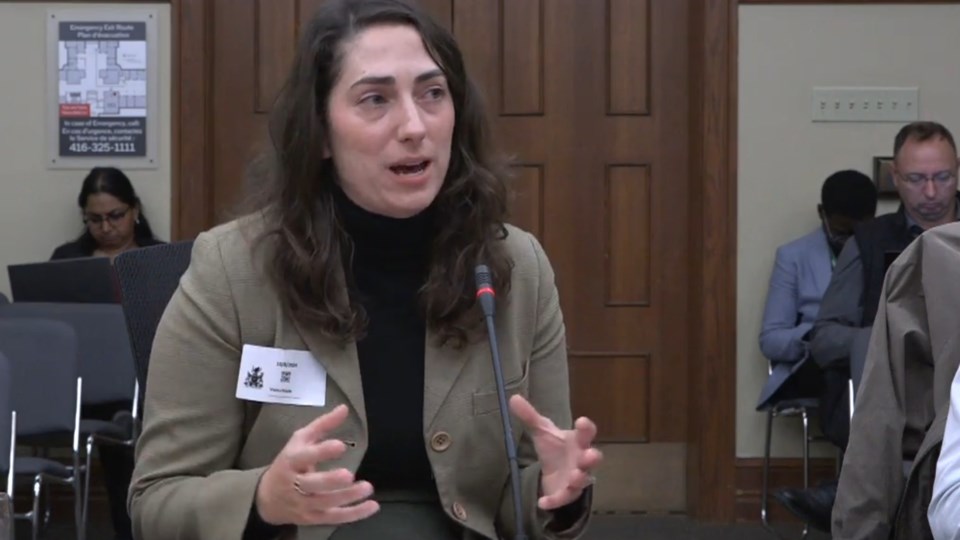Almost everyone who appeared before Ontario's finance and economic affairs committee on Tuesday to testify about the fifth iteration of the Working for Workers Act had good things to say about the labour law reforms it contains.
Some in attendance, including opposition lawmakers, were also wary of whether the new policies — or those from the previous four Working for Workers bills — can be effectively enforced.
Bill 190, the Working for Workers Five Act, would increase the maximum fine for those violating the Employee Standards Act from $50,000 to $100,000. During the meeting on Tuesday that was part of legislators study of the legislation, NDP MPP Jamie West questioned what its point is when offenders are seldom given the maximum fine.
"The highest fine in 2022 was $31,350, which is almost $20,000 less than the maximum. So my thought on this is maybe this is a paper tiger," noted West, who said this part of the bill amounts to little more than a "talking point" for the PC government to use.
Labour Minister Dave Piccini noted that judges determine the fees levied in any case.
West also pointed out that the number of proactive inspections of employers by the Ministry of Labour fell from 2,345 in 2018-19 to 788 in 2022-23, suggesting that fewer inspections are enabling employers to get away with using "workplace helpers, people who think they're apprentices but are not apprentices" — something he said the carpenters union has been complaining to him about.
Liberal MPP Andrea Hazell added that she has also received complaints from tradeswomen that the much-lauded rules from previous Working for Workers bills requiring clean bathroom cleanliness stocked with menstrual products are not being adequately enforced either.
"How do we hold those job sites, supervisors, and unions to account? Because this is still a major concern for women, even sanitary napkins [remain] an issue," Hazell said.
Steve Mantis from the Thunder Bay and District Injured Workers Support Group voiced similar concerns at the meeting held to review Bill 190, complaining that ineffective enforcement has led some employers to believe they can suppress job injury claims with impunity.
"It's almost impossible to prove in the court that an employer intended to suppress claims, so there are very few actual charges brought forward that are successful," said Mantis. "Bad businesses see that there's really no risk or downside. 'They're not going to catch us. Even if they catch us, what are they going to give us? A $250 fine?'"
According to Piccini, the province is currently hiring more inspectors. He also pointed to new data showing practice visits to workplaces have tripled in the last two years.
While inspections are important to enforcement, Piccini said the province would like to avoid issuing orders or charges and rely on "education and awareness" efforts whenever possible.
"Whether you are part of the government or not, I think we can all go and say, 'Did you know that at the Ontario legislature we've passed recent legislation that brings the same expectations [for bathroom cleanliness] from Bay Street to Main Street?'" Piccini said.
"The worst case is that you have to issue a stop work order, but obviously, we don't want to get there because we want to keep shovels in the ground."
Waterloo Region Community Legal Services employment lawyer Joanna Mullen told the committee that the province needs to give itself adequate powers to play hardball with the worst offenders; employers do get handed stiff fines but simply refuse to pay them.
Mullen pointed to the owner of a small grocery store chain in the Kitchener area called Dutchie's Fresh Food Market as an example.
Mike Renkema has been accused of withholding pay from his Ukrainian refugee workers and stiffing contractors. According to documents obtained by CTV News Kitchener, Renkema and his company have 23 outstanding orders to pay $188,000 for Employment Standard Act violations, and seven orders from the Ministry of Finance instructing him to pay $469,000.
"To date, all of the clients that we have served, only a small group of them have received any pay at all for their unpaid orders," Mullen said. "Their orders are outstanding from four years ago, and they only very recently received a very nominal amount that does not represent the full wages owing."
Mullen told the committee that Bill 109 should be amended to give the labour minister greater ability to strong-arm business owners into complying with orders, rather than leaving it up to the Ministry of Labour's collection process.
"The ministry should have more powers to strip employers of the licences that they need to operate a business, whether it's their business licence, a liquor licence, even a driver's licence," she said.
"They need to have some ability to actually go into these companies and say you can't do this anymore. You can't exploit these workers and take their money."




